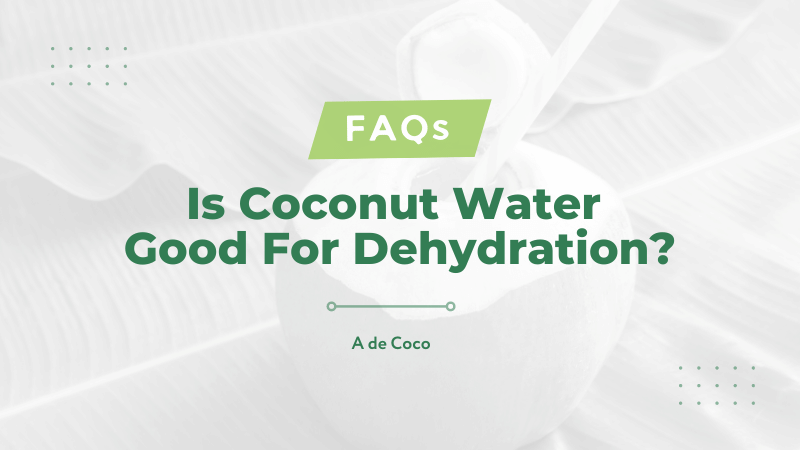Understanding the nutritional value of different beverages can significantly improve our health and wellness.
Coconut water has rapidly gained recognition as a brilliant thirst-quencher and a seemingly potent remedy for dehydration.
But how valid are these claims?
It’s crucial to dive into trustworthy scientific research and clear up misconceptions.
In this article, we’ll explore the science-backed benefits of coconut water, specifically focusing on its efficacy in combating dehydration.
We’ll also compare it to other drinks commonly used for hydration to give a more comprehensive view.
Contents
- Is Coconut Water Good For Dehydration?
- Step-by-Step: How Dehydration Occurs in the Body
- Composition of Coconut Water: A Look at Nutritional Profile
- How Does Coconut Water Aid in Hydration?
- Coconut Water vs. Water: How Do They Compare for Hydration?
- The Role of Potassium in Combating Dehydration
- Coconut Water vs. Sports Drinks
- Potential Side Effects of Consuming Too Much Coconut Water
- Expert Tips: Best Ways to Use Coconut Water for Hydration
- The Bottom Line
Is Coconut Water Good For Dehydration?
Yes, coconut water is beneficial for dehydration due to its high electrolyte content, particularly potassium. It is a natural, low-calorie alternative to sugary sports drinks. However, it should be consumed in moderation and does not replace the necessity of drinking regular water.
Expanding on this answer, it must be stressed that coconut water alone may not be sufficient in managing severe dehydration cases.
Severe dehydration might require medical attention and specific electrolyte solutions.
We are discussing this topic in more depth to assist you in understanding the various factors involved.
It’s vital that you are also aware of the potential drawbacks associated with excessive intake of coconut water.
While natural and beneficial, too much can lead to an imbalance in your body’s electrolytes which could have adverse health effects.
Moreover, understanding the role of other fluids in managing dehydration is important, as they provide diverse nutritional benefits that complement those provided by coconut water.
We also explore the comparison between coconut water and other common rehydration solutions like sports drinks and rehydration salts, to give a comprehensive view of your options.
The aim is to provide an informative and balanced discussion on coconut water and other solutions for dehydration.
With complete information, you can make an informed decision on how to keep yourself well-hydrated under various circumstances.
This is particularly useful for athletes, people living in hot climates, and those who are just keen on maintaining optimal hydration.
Step-by-Step: How Dehydration Occurs in the Body
Dehydration occurs when your body doesn’t have enough water to function normally. This can happen when the body loses more fluids than it takes in.
Sweating, urination, vomiting, and diarrhea are common ways through which the body loses fluid, and if not replenished, results in dehydration.
The human body is made up of approximately 60% water, which speaks of its immense necessity for our survival and proper functioning.
Initial Stages Of Dehydration
Dehydration often begins with a mild headache and fatigue.
These are the body’s initial indicators that it needs more fluids.
In this phase, you might also experience a noticeable thirst, a natural response to correct the water imbalance.
The symptoms of the initial stage of dehydration are your body’s way of signaling a water imbalance that needs to be corrected.
Thus, at the outset of dehydration, listening to your body’s cues for thirst and fatigue can help prevent further dehydration.
Ignoring these early signs and not taking enough fluid results in the progression of dehydration.
The Dangerous Progression of Dehydration
As dehydration progresses, you may experience dry mouth, a decrease in urine output, and a sudden increase in heart rate.
These symptoms alert you to the alarming fact: your body has begun moderating the remaining hydration to maintain essential functions.
Your body might also start experiencing muscle cramps and light-headedness due to reduced blood circulation.
Without immediate intervention, serious complications such as heat injury (from minor heat cramps to potentially life-threatening heat stroke), kidney problems, and even loss of consciousness can occur.
If dehydration progresses without immediate intervention, the consequences can be serious, including potential kidney problems and even loss of consciousness.
This clearly outlines the importance of adequate hydration for our bodies and the potentially harmful consequences of ignoring such needs.
In this video, you’ll see the amazing health benefits of coconut water. It’s a valuable source of hydration and can play an essential role in preventing the likely dangers of dehydration discussed above.
Understanding Dehydration in Infants and the Elderly
Dehydration can affect anyone, regardless of age, but it is especially dangerous for infants and the elderly.
The reason being, infants and older adults have lower water reserves, making them more susceptible to dehydration.
For infants specifically, they are at risk because a significant portion of their bodies is made up of water and they can’t express thirst the same way adults do.
In the elderly, the body’s ability to conserve water is reduced and the sense of thirst becomes less acute. This, combined with other health conditions, increases their vulnerability to dehydration.
Infants and older adults are more susceptible to dehydration due to lower water reserves and, in the case of elders, a decreased ability to conserve water and sense thirst.
Thus, it is critical to ensure these vulnerable groups are receiving adequate hydration.
Ultimately, understanding the process of dehydration, its signs, and how it can negatively affect the body is key to prevention. Equally as important, rehydrating the body effectively post-dehydration is crucial, hence the need to explore efficient ways of hydration like the benefits of coconut water as mentioned previously.
Composition of Coconut Water: A Look at Nutritional Profile
Coconut water has gained remarkable reputation as a healthy, natural beverage due to its impressive nutritional profile.
Extracted from young, green coconuts, this refreshing liquid is packed with several essential nutrients that contribute to its numerous health benefits.
Nutritional Facts
Primarily, coconut water is low in calories and has no cholesterol.
It’s a great source of two essential minerals, potassium and magnesium, which are known for ensuring proper body functions.
Additionally, it’s rich in vitamins, namely Vitamins B and C, and has a significant amount of dietary fiber.
Coconut water is also comprised of bio-active enzymes, supporting efficient digestion and boosting metabolism.
These enzymes are particularly beneficial in aiding digestion and promoting the efficient absorption of nutrients in the body.
The natural sugars in it not only sweeten the drink but also provide a moderate amount of carbohydrates, giving an instant energy boost.
Presence of Antioxidants
Another notable feature of coconut water is the presence of antioxidants.
These bio-active compounds help in fighting against the harmful effects of oxidative stress and free radicals in the body, supporting overall health and wellness.
They also have a vital role in maintaining optimal heart health and combating inflammation.
Hydrating Properties
Possessing a natural balance of minerals combined with its high water content, coconut water serves as an excellent natural hydrating agent.
It also comprises of electrolytes, very similar to the human blood, making it a better choice than conventional energy drinks for restoring hydration after physical exertion or extreme heat exposure.
Besides being low in sugar and calories, the high potassium content in it is also beneficial for maintaining a healthy heart rate and blood pressure.
By watching this video, you might gain a deeper understanding of the manifold health benefits of drinking coconut water regularly.
You will also discover its potential role in different aspects of general health maintenance.
How Does Coconut Water Aid in Hydration?
Coconut water is remarkably effective in rehydrating the body. This is primarily due to its unique composition and the presence of important electrolytes.
Natural Source of Electrolytes
Coconut water is packed full of essential electrolytes. These include sodium, potassium, and magnesium. Electrolytes are crucial for maintaining the fluid balance within the body. They help to transport water to the cells where it is needed most.
When the body is dehydrated, the level of electrolytes in the bloodstream can become imbalanced. By drinking coconut water, these levels can be restored, providing a quicker and more effective recovery from dehydration.
The high levels of potassium in coconut water in particular help to stimulate the kidneys, promoting the rehydration process. This electrolyte also plays a crucial role in muscle function and can help to prevent cramping.
Coconut water is packed full of essential electrolytes, which are crucial for maintaining the fluid balance within the body and helping transport water to the cells where it is needed most.
The body’s fluid balance and essential electrolyte levels are maintained by coconut water. This helps the body to better transport water to cells, which speeds up the rehydration process. Furthermore, potassium present in coconut water stimulates the kidneys and contributes to muscle function, reducing cramps which are often experienced during dehydration.
Low in Calories and Sugar
Unlike many sports drinks, coconut water is naturally low in calories and sugar. This makes it an excellent choice for those who are looking for a hydration solution that is not only effective, but also health-friendly.
Many beverages that are commonly used for hydration, like sports drinks, are loaded with added sugars. These can actually lead to dehydration if consumed in high amounts.
Coconut water, on the other hand, contains a natural sugar that is easy for the body to process. It provides a quick energy boost without the risk of dehydration associated with other sugary drinks.
Unlike many sports drinks, coconut water is naturally low in calories and sugar. This makes it an excellent choice for those who are looking for a hydration solution that is not only effective, but also health-friendly.
Coconut water’s low sugar and calorie content makes it healthier and safer than other rehydration alternatives. It provides a quick energy boost without dehydrating the body, unlike other sugary drinks. Moreover, coconut water is high in electrolytes, which helps maintain the body’s fluid balance better than many other hydration solutions.
Coconut Water vs. Water: How Do They Compare for Hydration?
Hydration is vital for maintaining optimal bodily functions and ensuring overall well-being.
Among the many sources of hydration, none are more universally recognized than traditional water and coconut water.
However, how do coconut water and regular water compare in terms of rehydration capabilities and benefits?
In this section, we will delve deep into their similarities, differences, and efficiency in combating dehydration.
Water: The Universal Hydrator
In terms of hydration, plain water sets the gold standard.
Our bodies are approximately 60% water, making it the purest form of replenishing lost body fluids.
Water helps regulate body temperature, lubricate joints, and even assists in transporting nutrients.
Water is essential for nearly every metabolic process in the body.
Its availability and zero-calorie nature make it an excellent choice for maintaining hydration on a regular basis.
However, when it comes to intense physical exertions or high-sweat scenarios, regular water might fall short due to its lack of electrolytes.
Coconut Water: The Natural Sports Drink
Coconut water has been dubbed the ‘natural sports drink’ for good reasons.
Loaded with essential electrolytes like potassium, sodium, magnesium, and a hint of natural sugars, coconut water serves as a superior replenishing drink after intense activities.
Coconut water’s high potassium content assists in balancing sodium levels and in regulated fluid balance.
In addition, it is lower in sugar and calories as compared to traditional sports dorinks.
Moreover, the mild taste and refreshing quality of coconut water can help quench thirst effectively.
However, it has a relatively lower sodium content than actual sport drinks, which are designed to replenish this particular electrolytes often lost in sweat.
To better understand the benefits of coconut water, watch this informative video:
You can learn more about the various health benefits of coconut water and how it impacts your body when consumed regularly.
The Role of Potassium in Combating Dehydration
When it comes to combatting dehydration, a well-balanced blend of electrolytes is crucial.
One such essential electrolyte, often overlooked, is potassium.
Understanding the Importance of Potassium
Potassium is a vital mineral and electrolyte that plays a key role in maintaining the overall function of the body.
It aids in the transportation of nutrients to cells and also helps in the removal of waste products from cells.
Moreover, potassium is central to the proper functioning of our nerves, muscles and heart.
Insufficient potassium can result in symptoms like muscle cramps, irregular heartbeat, and most notably, dehydration.
>Comprising of over 0.25% of a person’s total body weight, potassium is indispensable to several critical body functions.The above quote emphasizes the importance of potassium in the human body.
While the percentage might seem small, the role it plays in maintaining bodily functions and preventing dehydration cannot be understated.
How Potassium Helps Prevent Dehydration
Potassium assists in maintaining the body’s fluid balance, and thus, plays a significant role in preventing dehydration.
When the body loses water excessively, through sweat, diarrhea, or urination, it also loses significant amounts of essential electrolytes, including potassium.
Without adequate levels of these electrolytes, the body can’t absorb and retain enough water to stay hydrated.
>Potassium, together with other electrolytes, aids in the critical process of water absorption, promoting hydration and helping prevent or alleviate dehydration.This emphasizes the crucial role of potassium in promoting hydration.
Replenishing the body’s potassium levels can, therefore, enhance water absorption and help in combatting dehydration.
Sources of Potassium for Hydration
While potassium is available in many foods like bananas, oranges, and spinach, these may not be readily accessible during physical activities where dehydration is common.
Coconut water, on the other hand, is a natural source of high potassium levels, making it an excellent choice for hydrating during and after vigorous activities.
In fact, an average-sized green coconut contains about 600 milligrams of potassium, amounting to approximately 12% of the daily recommended intake.
>The richness of potassium in coconut water makes it an excellent choice for maintaining hydration balance.Above all, people who engage in strenuous exercises or those experiencing mild forms of dehydration could benefit from including coconut water in their hydration approach.
However, it’s crucial to note that while potassium plays a crucial role in hydration, maintaining overall electrolyte balance is also necessary for effective hydration.
Coconut Water vs. Sports Drinks
When discussing hydration, the conversation often centers around water and sports drinks.
However, an increasing number of people are turning to coconut water as a hydration solution.
In this section, we will compare the hydration efficacy of coconut water and sports drinks.
The Hydration Profile of Coconut Water
Among its many features, coconut water is naturally isotonic.
This means it has an electrolyte balance similar to that found in our cells and blood.
Notably, compared to sports drinks, it contains higher levels of potassium, an essential nutrient for hydration.
It also has less sugar and sodium, making it a healthier choice for maintaining hydration.
Indeed, the presence of essential electrolytes and its natural isotonic nature make coconut water an effective hydration solution.The high potassium content in coconut water aids in replenishing lost electrolytes during sweating, therefore boosting hydration. Conversely, the lower sugar and sodium content offer a healthier hydration option with less risk of health complications like high blood pressure or obesity.
The Hydration Efficacy of Sports Drinks
Sports drinks are designed to replenish electrolytes lost through sweating during intense physical activity.
Most sports drinks are formulated with optimal levels of sodium and other electrolytes to quickly rehydrate and energize athletes.
While these drinks do successfully aid in hydration, they also contain high levels of sugars and artificial ingredients.
Consequently, they can lead to health issues when consumed regularly and in large quantities.
This fact, coupled with the lower potassium content compared to coconut water, makes sports drinks less beneficial in the long-term.
Which is Better: Coconut Water or Sports Drinks?
Comparing coconut water and sports drinks, it is clear that while both assist in hydration, they do so in different ways and offer distinct benefits and potential drawbacks.
If you’re aiming for a healthier, natural hydration option, coconut water would be the better choice.
For people engaged in intense, prolonged physical activities where large amounts of electrolytes are lost, sports drinks might be more beneficial.
It is important to note that the choice between coconut water and sports drinks should take into account your physical activity level, general health, and personal preferences.
Potential Side Effects of Consuming Too Much Coconut Water
Coconut water has steadily gained popularity as a healthy, all-natural alternative to sports drinks and other hydration sources. This drink is hailed for its numerous benefits, including hydration, potassium, and magnesium. However, just like every other thing consumed in great quantities, it also carries potential downsides.
The Impact on the Kidneys
One area that could be impacted is the kidneys, as too much of anything might lead to overworking these vital organs. Coconut water contains good amounts of potassium, which is helpful in maintaining balance of electrolytes. However, consuming too much can lead to hyperkalemia, a condition characterized by high potassium levels in the blood.
The likelihood of developing this condition increases considerably if you suffer from kidney disorders. This is because these individuals struggle with excessive potassium intake which could potentially prove harmful.
Excessive consumption of coconut water could lead to hyperkalemia, a medical condition that could be particularly harmful for those with kidney issues.This not only underscores the importance of moderating intake, but also the necessity of consulting a healthcare provider when considering making coconut water a regular part of your diet, especially for those with pre-existing health conditions.
Electrolyte Imbalance
Another possible side effect of excessive coconut water consumption is an electrolyte imbalance. For many individuals, coconut water is a go-to source of electrolytes after a rigorous workout. However, if consumed in large amounts, the high levels of potassium and low levels of sodium in coconut water could disrupt the balance of electrolytes in the body.
In extreme cases, this electrolyte imbalance can lead to hyponatremia – a condition characterized by abnormally low sodium concentrations in the blood. Symptoms include tiredness, nausea, seizures, and in worst-case scenarios, even coma or death. Remember that balancing hydration with electrolyte intake is key.
Caloric Considerations
Another factor to consider is caloric intake. While coconut water is a better alternative to sugary drinks such as sodas and juice, it still contains calories. One cup of coconut water can contain anywhere from 45 to 60 calories.
Excessive consumption of coconut water could contribute to weight gain if not balanced with other caloric intake or physical activity.This is especially relevant if you are consuming coconut water as an everyday drink and are not compensating with increased physical activity or reduced caloric intake elsewhere in your diet.
Overall, it’s clear that while coconut water has many benefits, these potential side effects underscore the importance of consuming it in moderation. It’s always best to consult a healthcare provider or nutritionist to understand the potential benefits and risks, and to create a diet plan that is tailored to your individual needs.
Expert Tips: Best Ways to Use Coconut Water for Hydration
Coconut water has a unique composition of essential electrolytes making it a natural and effective solution to avoid dehydration.
The key to proper hydration is not only consuming fluids but also replenishing the important electrolytes we lose throughout the day.
One of the main advantages of coconut water is that it contains a significant amount of important minerals such as magnesium, calcium, sodium, but above all, potassium.
Choose the Right Coconut Water
When it comes to coconut water, not all products are created equal.
Choose a brand that’s 100% pure with no added sugars or flavorings.
Check labels and opt for a brand from young green coconuts for the highest hydration benefits.
Fermented or carbonated versions may also exist but they may have less hydrating benefits.
Choosing the right coconut water is crucial to its effectiveness in aiding proper hydration.
Choose a brand that’s 100% pure with no added sugars or flavorings.
This ensures that you will benefit from all the natural nutrients without the unnecessary additives.
By choosing the right product, you maximize the hydration potential of coconut water.
Drinking Coconut Water at the Right Time
Another factor you have to consider is the timing of your consumption.
Drinking it throughout the day can aid in continuous hydration, but it’s particularly beneficial after you sweat— such as post-workout.
During exercise, we lose minerals through sweat, and drinking coconut water can help replenish them.
By watching the embedded video, you’ll better understand the benefits of daily coconut water consumption. It also provides an excellent illustration of the transformational changes in hydration and overall wellness after incorporating coconut water into daily routine.
Moderation is Key
As beneficial as coconut water is for hydration, like with most things, moderation is key.
Too much can cause an imbalance in electrolytes and lead to conditions such as hyperkalemia.
It is recommended to limit consumption to one to two servings per day, particularly for those with kidney problems, as it is high in potassium.
Too much can cause an imbalance in electrolytes and lead to conditions such as hyperkalemia.
If you’re a healthy individual, hydrating primarily with coconut water should pose no problems.
However, if you have any existing health conditions, it’s always wise to consult a healthcare professional before making any major dietary changes.
Use Coconut Water in Other Ways
Lastly, coconut water is not only for drinking; it can be used in a variety of ways.
It can be used as a base for smoothies, in cooking to hydrate grains like quinoa, or even as popsicles for a refreshing summer treat!
The possibilities of using coconut water are vast, which makes incorporating it into your daily habits even easier.
In conclusion, whether you’re an athlete needing to replace lost electrolytes post-workout, an individual seeking natural alternatives for hydration, or simply someone who enjoys the refreshing taste – coconut water could be your ideal beverage choice.
The Bottom Line
Simply put, coconut water, with its impressive nutritional profile, is an effective natural hydrant that supports the body’s hydration needs.
It offers more electrolytes like potassium, than plain water, making it a superior choice in combating dehydration.
While coconut water competes well with sports drinks in terms of hydration efficiency, it is a healthier alternative due to its lower sugar content.
However, it’s important to note that moderation is key, as excessive consumption can lead to potential side effects.
Incorporating coconut water into your daily hydration strategy can be beneficial, especially during physical exertion or in hot climates.
That said, for specific advice tailoring your hydration needs, consulting a healthcare professional is always a wise choice.




